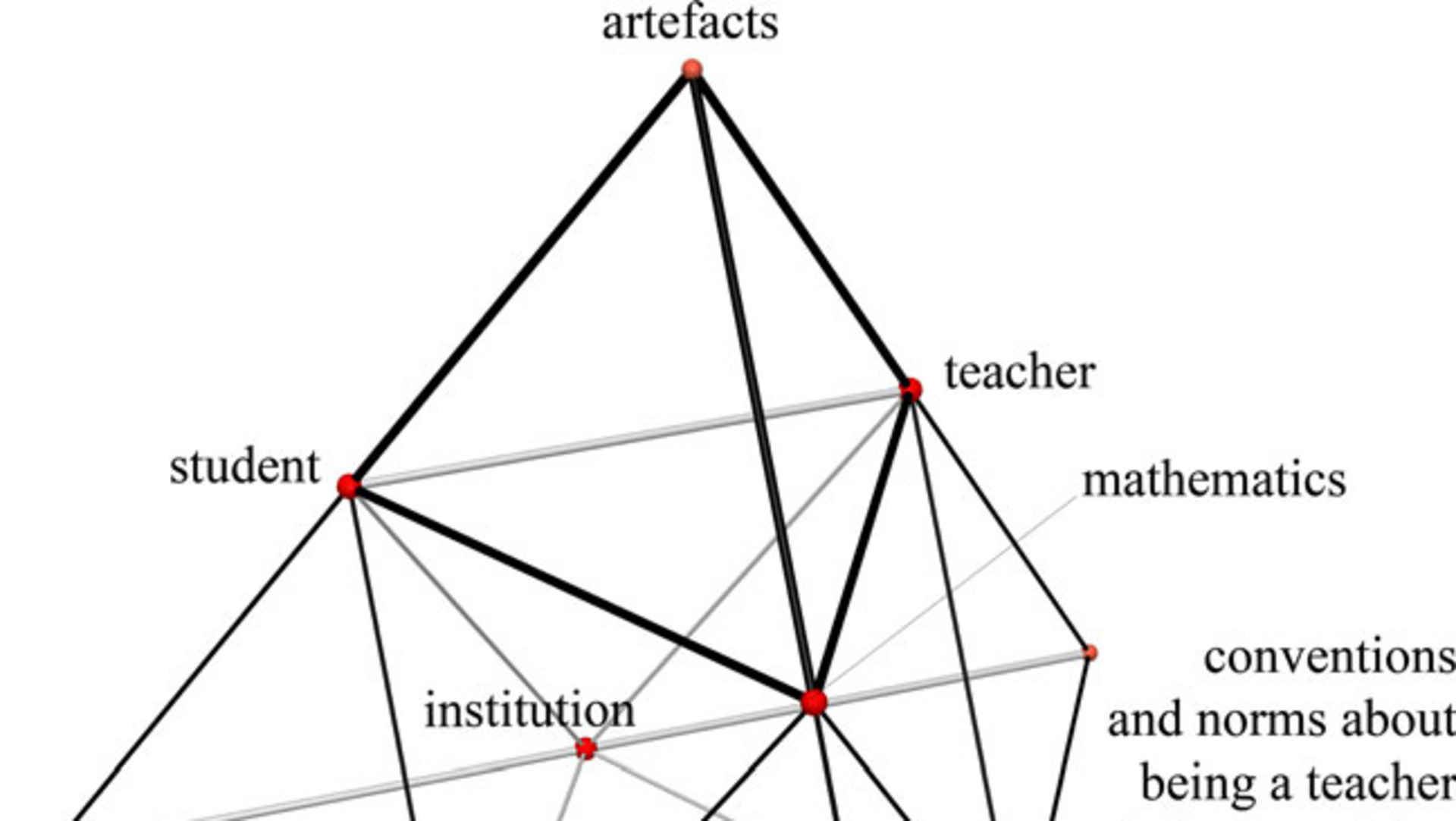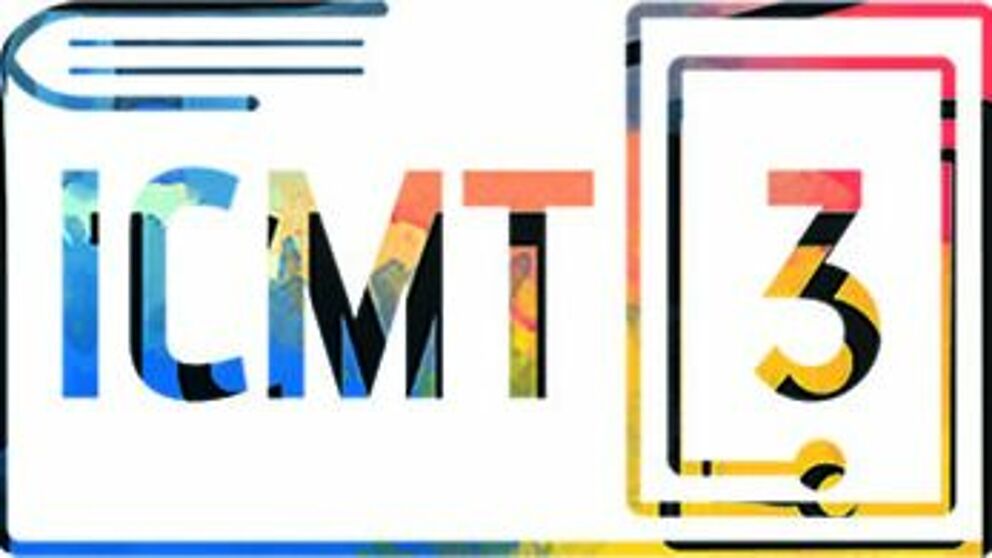Das Sozio-Didaktische Tetraeder als ein Modell der wesentlichen Konstituenten des Mathematikunterrichts sowie ihrer gegenseitigen Beziehungen und sozio-kulturellen Bedingungsfaktoren bildet den allgemeinen Rahmen meiner Forschung. Speziell untersuche ich verschiedene Beziehungen im Sozio-Didaktischen-Tetraeder in Bezug auf zwei unterschiedliche Artefakte: analoge und digitale (curriculare) Ressourcen und Sprache.
Forschungsschwerpunkte (incl. themenspezifischer Publikationen)
Die Forschung zu Schulbüchern und anderen curricularen Ressourcen ist mein Hauptinteressensgebiet. Es umfasst die ganze Spannbreite analoger und digitaler curricularer Ressourcen. Im Vordergrund stehen Fragen rund um die Nutzung und Wirkung mit einem spezifischen Fokus auf die Lernenden als Nutzende. Neben der Nutzungsforschung beschäftigen mich auch curriculare Aspekte von Schulbüchern und Governance-Fragen.
Themenspezifische Publikationen in chronologischer Reihenfolge
2024
Rezat, S. (2024). Research on curriculum resources in mathematics education: a survey of the field. ZDM – Mathematics Education. doi.org/10.1007/s11858-024-01559-x
2023
Rezat, S., & Geiger, V. (2023). The role of digital technologies in transforming student learning landscapes. In B. Pepin, G. Gueudet, & J. Choppin (Eds.), Handbook of digital resources in mathematics education (pp. 1–22). Springer International Publishing. https://doi.org/10.1007/978-3-030-95060-6_21-1
Pepin, B., Kock, Z.-j., & Rezat, S. (2023). Toward student agency in the selection and use of digital resources for learning and studying mathematics. In B. Pepin, G. Gueudet, & J. Choppin (Eds.), Handbook of digital resources in mathematics education (pp. 1–28). Springer International Publishing. https://doi.org/10.1007/978-3-030-95060-6_26-1
Gueudet, G., Pepin, B., & Rezat, S. (2023). Meta-resources: Supporting the design of mathematics teaching and learning. In B. Pepin, G. Gueudet, & J. Choppin (Eds.), Handbook of digital resources in mathematics education (pp. 1–34). Springer International Publishing. https://doi.org/10.1007/978-3-030-95060-6_36-1
2021
Rezat, S., Fan, L., & Pepin, B. (2021). Mathematics textbooks and curriculum resources as instruments for change. ZDM – Mathematics Education, 53(6), 1189–1206. https://doi.org/10.1007/s11858-021-01309-3
2020
Rezat, S. (2020). Mathematiklernen mit digitalen Schulbüchern im Spannungsfeld zwischen Individualisierung und Kooperation. In D. M. Meister & I. Mindt (Eds.), Mobile Medien im Schulkontext (pp. 199–213). Springer Fachmedien.
2019
Rezat, S., Fan, L., Hattermann, M., Schumacher, J., & Wuschke, H. (Eds.). (2019). Proceedings of the Third International Conference on Mathematics Textbook Research and Development. 16–19 September 2019, Paderborn, Germany. Universitätsbibliothek Paderborn.
Rezat, S. (2019). Die Nutzung und Wirkung von Lehr- und Lernmitteln im Deutschunterricht – Möglichkeiten der empirischen Analyse. In T. von Brand & F. Radvan (Eds.), Handbuch Lehr- und Lernmittel für den Deutschunterricht: Bestandsaufnahmen, Analysen und didaktische Reflexionen (pp. 180–191). Klett Kallmeyer.
Rezat, S., Le Hénaff, C., Visnovska, J., El Hage, S., Kim, O.-K., Leroyer, L., Sabra, H., Wang, C. (2019). Documentation Work, Design Capacity, and Teachers’ Expertise in Designing Instruction. In L. Trouche, G. Gueudet, & B. Pepin (Eds.), The 'Resource' Approach to Mathematics Education (pp. 323–388). Springer. https://doi.org/10.1007/978-3-030-20393-1_11
Rezat, S. (2019). Schulbuch? – aber bitte digital! – Den Einstieg in das Arbeiten mit digitalen Schulbüchern gestalten. In D. Walter & R. Rink (Eds.), Digitale Medien in der Lehrerbildung Mathematik: Konzeptionelles und Beispiele für die Primarstufe (pp. 215–237). WTM.
2018
Fan, L., Trouche, L., Qi, C., Rezat, S., & Visnovska, J. (Eds.). (2018). Research on mathematics textbooks and teachers' resources: advances and issues. Springer.
Rezat, S., Visnovska, J., Trouche, L., Qi, C., & Fan, L. (2018). Present research on mathematics textbooks and teachers’ resources in ICME-13: conclusion and perspectives. In L. Fan, L. Trouche, C. Qi, S. Rezat, & J. Visnovska (Eds.), Research on mathematics textbooks and teachers' resources: advances and issues (pp. 343–358). Springer. https://doi.org/10.1007/978-3-319-73253-4_16
Rezat, S., & Häsel-Weide, U. (2018). Examining peer-interaction during individual work with a digital textbook in a primary mathematics classroom. In H.-G. Weigand, A. Clark-Wilson, A. Donevska-Todorova, E. Faggiano, Grønbæk, & J. Trgalova (Eds.), Proceedings of the Fifth ERME Topic Conference (ETC 5) on Mathematics Education in the Digital Age (MEDA) 5-7 September 2018, Copenhagen, Denmark (pp. 209-2016). University of Copenhagen. http://erme.site/wp-content/uploads/2021/06/MEDA_2018_Proceedings.pdf
Rezat, S. (2018). Strategien zum Mathematiklernen mit dem Schulbuch. mathematik lehren, 211, 31–35.
2017
Fan, L., Trouche, L., Qi, C., Rezat, S., & Visnovska, J. (2017). Topic Study Group No. 38: Research on Resources (Textbooks, Learning Materials etc.). In Proceedings of the 13th International Congress on Mathematical Education (pp. 561–564). Springer. https://doi.org/10.1007/978-3-319-62597-3_65
2015
Rezat, S., & Sträßer, R. (2015). Methodological issues and challenges in research on mathematics textbooks. Nordic Studies in Mathematics Education, 20(3–4), 247–266. https://ncm.gu.se/wp-content/uploads/2020/06/20_34_247266_rezat.pdf
2014
Rezat, S. (Hg.) (2014). Mit dem Mathebuch kreativ umgehen. Fördermagazin Sekundarstufe, 36(2).
Rezat, S. (2014). Mathematikunterricht nach Buch? Mathematikunterricht mit Buch! Fördermagazin Sekundarstufe, 36(2), 5–8.
Rezat, S. (2014). (Elektronische) Schulbücher - Von Artefakten zu Instrumenten. In M. Schuhen & M. Froitzheim (Eds.), Das elektronische Schulbuch: Fachdidaktische Anforderungen und Ideen treffen auf Lösungsvorschläge der Informatik (pp. 1–19). Berlin: Lit.
Rezat, S., & Sträßer, R. (2014). Mathematics textbooks and how they are used. In P. Andrews & T. Rowland (Eds.), Masterclass in mathematics education: International perspectives on teaching and learning (pp. 51–62). Bloomsbury.
2013
Rezat, S. (2013). The textbook-in-use: students’ utilization schemes of mathematics textbooks related to self-regulated practicing. ZDM – Mathematics Education, 45(5), 659–670. https://doi.org/10.1007/s11858-013-0529-z
Rezat, S., & Sträßer, R. (2013). Methodologies in Nordic Research on Mathematics Textbooks In B. Grevholm, P. S. Hundeland, K. Juter, K. Kislenko & P. E. Persson (Eds.), Nordic research in didactics of mathematics: Past, present and future (pp. 469–482). Capelen Damm.
2012
Rezat, S. (2012). Wie wählen Schülerinnen und Schüler Schulbuchinhalte aus? Ergebnisse zur selbstständigen Nutzung von Mathematikschulbüchern. In J. Doll, K. Frank, D. Fickermann & K. Schwippert (Eds.), Schulbücher im Fokus. Nutzungen, Wirkungen und Evaluation (pp. 113–129). Münster: Waxmann.
Rezat, S., & Sträßer, R. (2012). From the didactical triangle to the socio-didactical tetrahedron: artifacts as fundamental constituents of the didactical situation. ZDM – Mathematics Education, 44(5), 641–651. https://doi.org/10.1007/s11858-012-0448-4
2011
Rezat, S. (2011). Wozu verwenden Schüler ihre Mathematikschulbücher? Ein Vergleich von erwarteter und tatsächlicher Nutzung. Journal für Mathematik-Didaktik, 32(2), 153–177. https://doi.org/10.1007/s13138-011-0028-0
Rezat, S. (2011). Interactions of teachers’ and students’ use of mathematics textbooks. In G. Gueudet, B. Pepin, & L. Trouche (Eds.), From text to 'lived' resources. Mathematics curriculum materials and teacher development (pp. 231–246). Springer. https://doi.org/10.1007/978-94-007-1966-8_12
2010
Rezat, S. (2010). Ein Beitrag zur Methodik der Schulbuchnutzungsforschung. In S. Ehlers (Ed.), Empirie und Schulbuch. Vorträge des Giessener Symposiums zur Lesebuchforschung (pp. 11–26, Siegener Schriften zur Kanonforschung, Vol. 10). Peter Lang.
Rezat, S. (2010). The utilization of mathematics textbooks as instruments for learning. In V. Durand-Guerrier, S. Soury-Lavergne, & F. Arzarello (Eds.), Proceedings of the Sixth Congress of the European Society for Research in Mathematics Education. January 28th-February 1st 2009 Lyon (France) (pp. 1260–1269). INRP. http://erme.site/wp-content/uploads/2021/06/cerme6_proceedings.pdf
2009
Rezat, S. (2009). Das Mathematikbuch als Instrument des Schülers. Eine Studie zur Schulbuchnutzung in den Sekundarstufen. Vieweg+Teubner. https://doi.org/10.1007/978-3-8348-9628-5
Rezat, S. (2009). Das Mathematikschulbuch als Instrument des Schülers - Eine empirische Studie zur Schulbuchnutzung in den Sekundarstufen. Journal für Mathematik-Didaktik, 30(3/4), 287–288. https://doi.org/10.1007/BF03339086
2008
Rezat, S. (2008). Die Struktur von Mathematikschulbüchern. Journal für Mathematik-Didaktik, 29(1), 46–67. https://doi.org/10.1007/BF03339361
Rezat, S. (2008). Learning Mathematics with Textbooks. In O. Figueras, J. L. Cortina, S. Alatorre, T. Rojano, & A. Sepúlveda (Eds.), Proceedings of the Joint Meeting of PME 32 und PME-NA XXX (Vol. 4, pp. 177-184). Cinestav-UMSNH.
2006
Rezat, S. (2006). A Model of Textbook Use. In J. Novotná, H. Moraová, M. Krátká, & N. a. Stehlíková (Eds.), Proceedings of the 30th Conference of the International Group for the Psychology of Mathematics Education (Vol. 4, pp. 409–416). Prague, Czech Republic: Charles University, Faculty of Education.
Rezat, S. (2006). The structures of German mathematics textbooks. ZDM – Mathematics Educaation, 38(6), 482–487. https://doi.org/10.1007/BF02652785
Automatisiertes Feedback ist derzeit eines der zentralen Features, das digitale von analogen curricularen Resourcen unterscheidet. Feedback betrachte ich ebenfalls als Artefakt und untersuche seine Nutzung und Wirkung auf das konzeptuelle Verständnis der Lernenden im Kontext des Sozio-Didaktischen Tetraeders.
Themenspezifische Publikationen in chronologischer Reihenfolge
2023
Rezat, S., & Geiger, V. (2023). The role of digital technologies in transforming student learning landscapes. In B. Pepin, G. Gueudet, & J. Choppin (Eds.), Handbook of digital resources in mathematics education (pp. 1–22). Springer International Publishing. https://doi.org/10.1007/978-3-030-95060-6_21-1
2021
Rezat, S. (2021). How automated feedback from a digital mathematics textbook affects primary students’ conceptual development: two case studies. ZDM – Mathematics Education, 53(6), 1433–1445. https://doi.org/10.1007/s11858-021-01263-0
Rezat, S., Schacht, F., & Häsel-Weide, U. (2021). Challenges of making sense of tasks and automated feedback in digital mathematics textbooks. In A. Clark-Wilson, A. Donevska-Todorova, E. Faggiano, J. Trgalová, & H.-G. Weigand (Eds.), Mathematics education in the digital age: Learning, practice and theory (pp. 168–184). Routledge. https://doi.org/10.4324/9781003137580
2019
Rezat, S. (2019). Analysing the effectiveness of a combination of different types of feedback in a digital textbook for primary level. In S. Rezat, L. Fan, M. Hattermann, J. Schumacher, & H. Wuschke (Eds.), Proceedings of the Third International Conference on Mathematics Textbook Research and Development. 16–19 September 2019, Paderborn, Germany (pp. 51–56). Universitätsbibliothek Paderborn.
2017
Rezat, S. (2017). Students’ utilizations of feedback provided by an interactive mathematics e-textbook for primary level. In T. Dooley & G. Gueudet (Eds.), Proceedings of the Tenth Congress of the European Society for Research in Mathematics Education (CERME10, February 1-5, 2017) (pp. 3724–3731). Dublin, Ireland: Dublin City University, Institute of Education, and ERME. https://hal.science/hal-01950495/document
Hügel, C., Pellander, C., & Rezat, S. (2017). Vorsicht Feedback! Beim Arbeiten mit digitalen Schulbüchern bleiben Lehrende unersetzlich. Mathematik Differenziert, 2017(1), 14–21.
Im Zusammenhang mit sprachlichen Aspekten des Mathematiklernens liegt mein primäres Interesse an genrebasierten Ansätzen. Ein besonderer Fokus liegt dabei auf den Genres "Erklären" und "anwendungsorientierte Aufgaben". Die Fragestellungen in diesem Zusammenhang beziehen sich dabei vorrangig auf Mögilchkeiten der Förderung des Erwerbs dieser Genres im Mathematikunterricht.
Ein weiteres Interesse im Kontext sprachlicher Aspekte des Mathematiklernens ist die Förderung des Lesens mathematischer Fachtexte vorrangig im Bereich der Lehrerausbildung. Hier entwickle ich Veranstaltungskonzepte, in denen fachspezifische Lesekompetenzen unter der Nutzung digitaler Technologien gefördert werden können. Dabei spielt auch die theoretische Frage, was mathematikspezifische Lesekompetenz kennzeichnet, eine Rolle.
Themenspezifische Publikationen in chronologischer Reihenfolge
2022
Rezat, S., Malik, S., & Leifeld, M. (2022). Scaffolding Close Reading of Mathematical Text in Pre-service Primary Teacher Education at the Tertiary Level: Design and Evaluation. International Journal of Science and Mathematics Education, 20(Suppl 1), 215–236. https://doi.org/10.1007/s10763-022-10309-y
Malik, S., & Rezat, S. (2022). Linguistic features of word problems that cause difficulties for learners across the curriculum: A literature review. In J. Hodgen, E. Geraniou, G. Bolondi, & F. Ferretti (Eds.), Proceedings of the Twelfth Congress of the European Society for Research in Mathematics Education (CERME12) (pp. 1571–1578). Free University of Bozen-Bolzano, Italy and ERME. https://hal.science/hal-03745979/document
2019
Rezat, S., & Rezat, S. (2019). „… weil man Fermi-Aufgaben so rechnet“: Modelltexte als sprachliche Ressource für das Erklären von Lösungswegen bei Fermi-Aufgaben. Mathematik Differenziert, 2019(3), 30–37.
2018
Kuzminykh, K., Rezat, S., & Topalović, E. (2018). Textaufgaben verstehen: Lesen und Variieren komplexer Textaufgaben mit sprachlich-mathematischen Strategien. mathematik lehren, 211, 36–46.
2017
Rezat, S., & Rezat, S. (2017). Subject-specific genres and genre awareness in integrated mathematics and language teaching. Eurasia Journal of Mathematics, Science and Technology Education, 13(7), 4189–4210. https://doi.org/10.12973/eurasia.2017.00805a
2012
Rezat, S. & Rezat, S. (2012). Mathematische Sachaufgaben verstehen und erklären. Praxis Deutsch 233, 36–41.
Mein spezifisches Interesse im Bereich der Propädeutik der Algebra liegt an der Schnittstelle zu Zahlbereichserweiterungen und dem algorithmischen Denken. Im Vordergrund steht hier die theorie- und empiriebasierte Entwicklung von Lernangeboten zur Förderung algebraischen Denkens in diesen beiden Bereichen.
Themenspezifische Publikationen in chronologischer Reihenfolge
2023
Hefendehl-Hebeker, L., & Rezat, S. (2023). Algebra: Leitidee Symbol und Formalisierung. In R. Bruder, A. Büchter, H. Gasteiger, B. Schmidt-Thieme, & H.-G. Weigand (Eds.), Handbuch der Mathematikdidaktik (pp. 123–158). Springer. https://doi.org/10.1007/978-3-662-66604-3_5
2020
Schumacher, J., & Rezat, S. (2020). Rekonstruktion diagrammatischen Schließens beim Erlernen der Subtraktion negativer Zahlen. In G. Kadunz (Ed.), Zeichen und Sprache im Mathematikunterricht: Semiotik in Theorie und Praxis (pp. 85–112). Springer. https://doi.org/10.1007/978-3-662-61194-4_5
2019
Rezat, S. (2019). Extensions of number systems: Continuities and discontinuities revisited. In U. Janqvist, M. van den Heuvel-Panhuizen, & M. Veldhuis (Eds.), Proceedings of the Eleventh Congress of the European Society for Research in Mathematics Education (CERME11, February 6 – 10, 2019) (pp. 56–80). Freudenthal Group & Freudenthal Institute, Utrecht University and ERME.
Schumacher, J., & Rezat, S. (2019). A Hypothetical Learning Trajectory for the learning of the rules for manipulating integers. In U. Janqvist, M. van den Heuvel-Panhuizen, & M. Veldhuis (Eds.), Proceedings of the Eleventh Congress of the European Society for Research in Mathematics Education (CERME11, February 6 – 10, 2019) (pp. 4318–4325). Freudenthal Group & Freudenthal Institute, Utrecht University and ERME.
2018
Rezat, S., & Rye Ejersbo, L. (2018). Number sense in teaching and learning arithmetic. In T. Dreyfus, M. Artige, D. Potari, S. Prediger, & K. Ruthven (Eds.), Developing research in mathematics education: twenty years of communication, cooperation and collaboration in Europe (pp. 23–31). Routledge.
2011 – 2015
Hefendehl-Hebeker, L., & Rezat, S. (2015). Algebra: Leitidee Symbol und Formalisierung. In R. Bruder, L. Hefendehl-Hebeker, B. Schmidt-Thieme, & H.-G. Weigand (Eds.), Handbuch der Mathematikdidaktik (pp. 117–148). Springer.
Rezat, S. (2014). Das Permanenzprinzip erfahren. An der 1+1 Tafel und der 1x1 Tafel das Rechnen mit negativen Zahlen operativ erkunden. mathematik lehren, 183, 11–14.
Rezat, S. (2012). Rechnen mit ganzen Zahlen. Den Zahlenblick für Addition und Subtraktion schulen. mathematik lehren, 171, 23–24, 41–43.
Rezat, S. (2011). Mental Calculation Strategies for Addition and Subtraction in the Set of Rational Numbers. In M. Pytlak, E. Swoboda & T. Rowland (Eds.), Proceedings of the Seventh Congress of the European Society for Research in Mathematics Education (pp. 396–405). Rzeszów, Poland: University of Rzeszów, Poland.
Ein spezifisches Interesse habe ich an Theorieentwicklung und methodischen Fragestellungen. Diese stehen einerseits in enger Verbindung mit den anderen Forschungsschwerpunkten, sind teilweise aber auch eigenständig. Zu letzteren zählt insbesondere die Auseinandersetzung mit fundamentalen Ideen der Mathematikdidaktik als wissenschaftlicher Disziplin.
Themenspezifische Publikationen in thematischer Reihenfolge
Methodische Beiträge
Vollstedt, M., & Rezat, S. (2019). An Introduction to Grounded Theory with a Special Focus on Axial Coding and the Coding Paradigm. In Compendium for Early Career Researchers in Mathematics Education (pp. 81–100). Springer. https://doi.org/10.1007/978-3-030-15636-7_4
Hußmann, S., Rezat, S., & Sträßer, R. (2016). Subject Matter Didactics in Mathematics Education. Journal für Mathematik-Didaktik, 37(1 Supplement), 1–9. https://doi.org/10.1007/s13138-016-0105-5
Rezat, S., & Sträßer, R. (2015). Methodological issues and challenges in research on mathematics textbooks. Nordic Studies in Mathematics Education, 20(3–4), 247–266. https://ncm.gu.se/wp-content/uploads/2020/06/20_34_247266_rezat.pdf
Rezat, S. (2010). Ein Beitrag zur Methodik der Schulbuchnutzungsforschung. In S. Ehlers (Ed.), Empirie und Schulbuch. Vorträge des Giessener Symposiums zur Lesebuchforschung (pp. 11–26, Siegener Schriften zur Kanonforschung, Vol. 10). Peter Lang.
Das Sozio-Didaktische Tetraeder
Rezat, S., & Sträßer, R. (2020). Die Nutzung des Sozio-Didaktischen Tetraeders in der mathematikdidaktischen Forschung. In H.-S. Siller, W. Weigel, & J. F. Wörler, (Eds.). Beiträge zum Mathematikunterricht 2020 (pp. 765–768). WTM-Verlag.
https://doi.org/10.37626/GA9783959871402.0
eldorado.tu-dortmund.de/bitstream/2003/39621/1/BzMu2020_REZAT-id397.pdf
Rezat, S., & Sträßer, R. (2012). From the didactical triangle to the socio-didactical tetrahedron: artifacts as fundamental constituents of the didactical situation. ZDM – Mathematics Education, 44(5), 641–651. https://doi.org/10.1007/s11858-012-0448-4
Rezat, S. (2006). A Model of Textbook Use. In J. Novotná, H. Moraová, M. Krátká, & N. a. Stehlíková (Eds.), Proceedings of the 30th Conference of the International Group for the Psychology of Mathematics Education (Vol. 4, pp. 409–416). Prague, Czech Republic: Charles University, Faculty of Education.
Fundamentale Ideen der Mathematikdidaktik
Rezat, S., Hattermann, M., & Peter-Koop, A. (Eds.). (2014). Transformation - A fundamental idea of mathematics education. Springer.
Rezat, S. (2012). Fundamental ideas: A means to provide focus and identity in didactics of mathematics as a scientific discipline? In T. Y. Tso (Ed.), Proceedings of the 36th Conference of the International Group for the Psychology of Mathematics Education (Vol. 4, pp. 3–10). PME.
Handbuchartikel
Hattermann, M., Rezat, S., & Sträßer, R. (2023). Geometrie: Leitidee Raum und Form. In R. Bruder, A. Büchter, H. Gasteiger, B. Schmidt-Thieme, & H.-G. Weigand (Eds.), Handbuch der Mathematikdidaktik (pp. 201–242). Springer. https://doi.org/10.1007/978-3-662-66604-3_7
Hefendehl-Hebeker, L., & Rezat, S. (2023). Algebra: Leitidee Symbol und Formalisierung. In R. Bruder, A. Büchter, H. Gasteiger, B. Schmidt-Thieme, & H.-G. Weigand (Eds.), Handbuch der Mathematikdidaktik (pp. 123–158). Springer. https://doi.org/10.1007/978-3-662-66604-3_5
Rezat, S., & Geiger, V. (2023). The role of digital technologies in transforming student learning landscapes. In B. Pepin, G. Gueudet, & J. Choppin (Eds.), Handbook of digital resources in mathematics education (pp. 1–22). Springer International Publishing. https://doi.org/10.1007/978-3-030-95060-6_21-1
Pepin, B., Kock, Z.-j., & Rezat, S. (2023). Toward student agency in the selection and use of digital resources for learning and studying mathematics. In B. Pepin, G. Gueudet, & J. Choppin (Eds.), Handbook of digital resources in mathematics education (pp. 1–28). Springer International Publishing. https://doi.org/10.1007/978-3-030-95060-6_26-1
Gueudet, G., Pepin, B., & Rezat, S. (2023). Meta-resources: Supporting the design of mathematics teaching and learning. In B. Pepin, G. Gueudet, & J. Choppin (Eds.), Handbook of digital resources in mathematics education (pp. 1–34). Springer International Publishing. https://doi.org/10.1007/978-3-030-95060-6_36-1
Hattermann, M., Kadunz, G., Rezat, S., & Sträßer, R. (2015). Geometrie: Leitidee Raum und Form. In R. Bruder, L. Hefendehl-Hebeker, B. Schmidt-Thieme, & H.-G. Weigand (Eds.), Handbuch der Mathematikdidaktik (pp. 185–219). Springer.
Hefendehl-Hebeker, L., & Rezat, S. (2015). Algebra: Leitidee Symbol und Formalisierung. In R. Bruder, L. Hefendehl-Hebecker, B. Schmidt-Thieme, & H.-G. Weigand (Eds.), Handbuch der Mathematikdidaktik (pp. 117-148). Springer.
Rezat, S., & Sträßer, R. (2014). Mathematics textbooks and how they are used. In P. Andrews & T. Rowland (Eds.), Masterclass in mathematics education: International perspectives on teaching and learning (pp. 51–62). Bloomsbury.
Projekte
Keynotes
29.09.2023 | GDM Arbeitskreis Mathematikunterricht und Digitale Werkzeuge, Freiburg Titel: (Lernenprozesse mit) Digitale(n) Mathematikschulbücher(n) mit automatisiertem Feedback (verstehen) – Status quo und Perspektiven |
14.11.2022 | Fourth International Conference on Mathematics Textbooks Research and Development (ICMT4) in Beijing, China Titel: Students’ learning of mathematics from text(books) and other curriculum resources |
08.02.2019 | Eleventh Congress of the European Society for Research in Mathematics Education (CERME11) Titel: Extensions of number systems: continuities and discontinuities revisited |
24.11.2014 | Interdisziplinäre Tagung “Das Schulbuch als Wissensmedium: Produktion – Darstellung – Rezeption” am Institut für Soziologie der Johannes-Gutenberg-Universität Mainz |
20.02.2014 | Interdisziplinäre Konferenz “das elektronische Schulbuch – Fachdidaktische Anforderungen und Ideen treffen auf Lösungsvorschläge der Informatik” an der Universtität Siegen Titel: (Mathematik-)Schulbücher – Von Artefakten zu Instrumenten |


